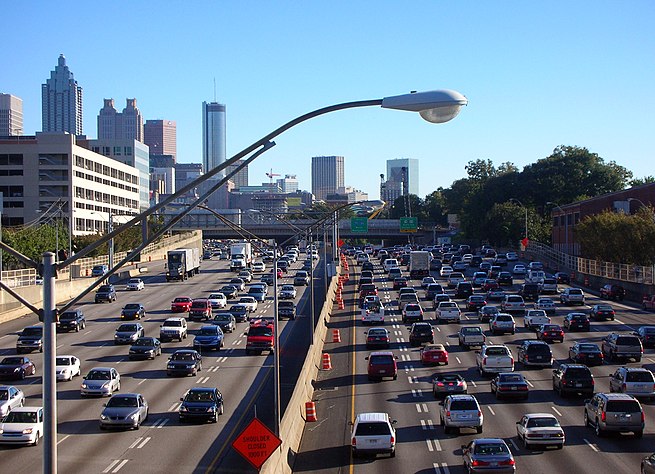Main Difference
The main difference between Interstate and Freeway is that the Interstate is a highway system and Freeway is a highway designed exclusively for high-speed vehicular traffic, with all traffic flow and ingress/egress regulated.
-
Interstate
The Dwight D. Eisenhower National System of Interstate and Defense Highways (commonly known as the Interstate Highway System, Interstate Freeways, or simply the Interstate) is a network of controlled-access highways that forms a part of the National Highway System of the United States. The system is named for President Dwight D. Eisenhower, who championed its formation. Construction was authorized by the Federal Aid Highway Act of 1956, and the original portion was completed 35 years later, although some urban routes were cancelled and never built. The network has since been extended and, as of 2013, it had a total length of 47,856 miles (77,017 km). As of 2013, about one-quarter of all vehicle miles driven in the country use the Interstate system. In 2006, the cost of construction was estimated at about $425 billion (equivalent to $499 billion in 2016).
-
Freeway
A controlled-access highway is a type of highway which has been designed for high-speed vehicular traffic, with all traffic flow and ingress/egress regulated. Common English terms are freeway (in Australia, South Africa and parts of the United States and Canada), motorway (in the United Kingdom, Ireland, New Zealand and parts of Australia), expressway (in some parts of Canada, parts of the United States, and many Asian countries), and autoroute (in Québec, Canada). Other similar terms include Interstate and parkway. Some of these may be limited-access highways, although this term can also refer to a class of highway with somewhat less isolation from other traffic.
In countries following the Vienna convention, the motorway qualification implies they are forbidden for walking or parking, and reserved for the use of motorised vehicles only.
A controlled-access highway provides an unhindered flow of traffic, with no traffic signals, intersections or property access. They are free of any at-grade crossings with other roads, railways, or pedestrian paths, which are instead carried by overpasses and underpasses. Entrances and exits to the highway are provided at interchanges by slip roads (ramps), which allow for speed changes between the highway and arterials and collector roads. On the controlled-access highway, opposing directions of travel are generally separated by a median strip or central reservation containing a traffic barrier or grass. Elimination of conflicts with other directions of traffic dramatically improves safety and capacity.
Controlled-access highways evolved during the first half of the 20th century. Italy opened its first autostrada in 1924, A8, connecting Milan to Varese. Germany began to build its first controlled-access autobahn without speed limits (30-kilometre (19 mi) on what is now A555, then referred to as a dual highway) in 1932 between Cologne and Bonn. It then rapidly constructed a nationwide system of such roads. The first North American freeways (known as parkways) opened in the New York City area in the 1920s. Britain, heavily influenced by the railways, did not build its first motorway, the Preston By-pass (M6), until 1958.
Most technologically advanced nations feature an extensive network of freeways or motorways to provide high-capacity urban travel, or high-speed rural travel, or both. Many have a national-level or even international-level (e.g. European E route) system of route numbering.
-
Interstate (adjective)
Of, or relating to two or more states.
-
Interstate (adverb)
Crossing states (usually provincial state, but also e.g. multinational sense).
“The truck driver drove interstate to unload.”
-
Interstate (noun)
A Interstate Highway System.
-
Freeway (noun)
A road designed for safe, high-speed operation of motor vehicles through the elimination of at-grade intersections, usually divided and having at least two lanes in each direction; a dual carriageway with no at-grade crossings, a motorway.
-
Freeway (noun)
A toll-free highway.

